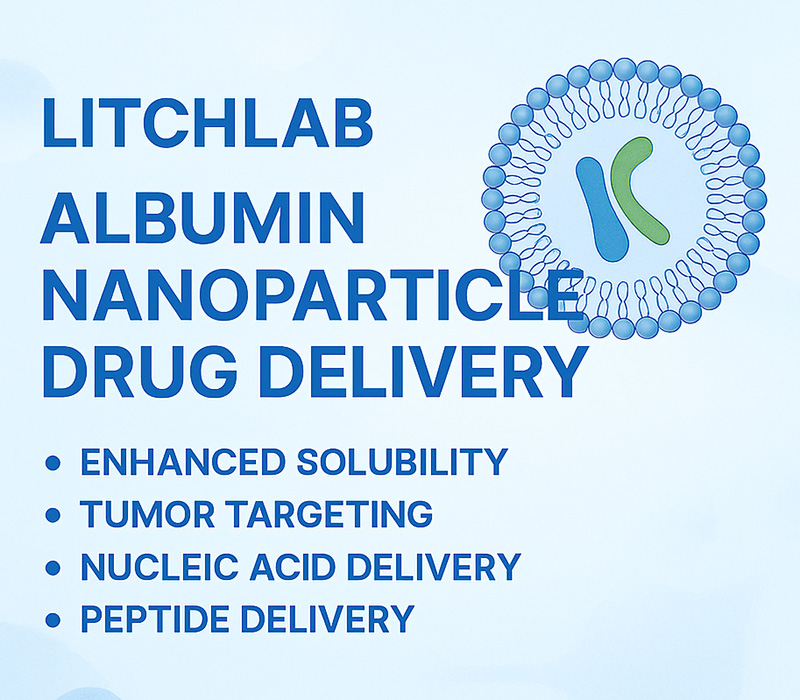
Litchlab, a global CDMO and technology innovator in next-generation drug delivery, today announced significant advancements in its albumin nanoparticle (ANP) platform technology, expanding its applications to include nucleic acid drugs, chemotherapeutics, and peptide delivery. With a focus on scalable manufacturing, tumor-targeting strategies, and global regulatory readiness, Litchlab’s ANP systems are now emerging as one of the most promising carriers in the field of precision medicine.

Albumin, a natural and biocompatible protein abundant in human plasma, offers unique advantages as a drug delivery vehicle: low immunogenicity, long circulation half-life, and active targeting through gp60 and SPARC-mediated pathways. Building upon the success of albumin-bound paclitaxel (Abraxane®), Litchlab has developed a new generation of engineered albumin nanoparticles capable of:
Enhancing payload solubility and stability (especially for poorly soluble APIs)
Actively targeting tumors, fibrotic tissues, and inflamed organs
Co-encapsulating small molecules, RNA, peptides, or imaging probes
Adapting to multiple routes of administration (IV, inhalation, subcutaneous)
Recent in vivo studies demonstrated that Litchlab’s modified ANPs improve liver and lung delivery of siRNA by over 6-fold, compared to standard lipid nanoparticles (LNPs), while reducing systemic toxicity and cytokine release.
Litchlab’s full-spectrum CDMO services for albumin nanoparticle therapeutics now cover:
Formulation design & screening: Native, recombinant, or PEGylated albumin; ionic & covalent drug loading; particle size control (80–150 nm)
Preclinical process optimization: QbD-guided design, DoE formulation, predictive AI-based modeling
Analytical method development: Encapsulation efficiency, particle size/zeta, drug release kinetics, residual solvents, protein quantification
Non-GMP and GMP manufacturing: From milligram R&D batches to kilogram-scale pilot runs, with continuous flow capabilities
CMC and regulatory support: IND/IMPD package preparation for U.S., EU, and China submissions
A proprietary lyophilization protocol developed by Litchlab further enables long-term ANP stability at 2–8°C, suitable for global clinical trials.
Litchlab has already initiated multiple global collaborations in oncology, fibrosis, ophthalmology, and gene therapy. Key projects include:
siRNA-ANP for idiopathic pulmonary fibrosis (in collaboration with a U.S.-based biotech)
Albumin-based delivery of tumor immunomodulators for solid tumors
Gene editing (CRISPR/Cas) delivered via albumin nanocarriers for brain-targeted therapies
Inhalable albumin nanoparticles for mRNA vaccines against respiratory viruses
The company also offers co-development programs for partners seeking to de-risk formulation development through a milestone-based model.
To align with global regulatory and ESG trends, Litchlab is actively implementing:
Solvent-free or aqueous ANP processes to reduce hazardous waste
Automated continuous microreactors for scale-up with minimal batch variability
In-line PAT tools for real-time process control and QA/QC
Green chemistry workflows with lower carbon and water footprint
By integrating AI-driven design with sustainable pharmaceutical engineering, Litchlab aims to position albumin nanoparticles as not just a delivery tool—but a next-generation platform in biopharma manufacturing.
“The convergence of biologics, nucleic acids, and nanotechnology demands a delivery platform that’s modular, safe, and scalable,” said Dr. Y. Chen, Chief Scientific Officer of Litchlab. “Our albumin nanoparticle system is built for that future.”
Looking ahead, Litchlab plans to expand its platform to support antibody-drug conjugates (ADCs), oligonucleotide therapies, and combination regimens. With clinical readiness, global CDMO infrastructure, and ongoing investment in platform innovation, Litchlab is well-positioned to shape the future of personalized drug delivery.
Contact: RD2@litchlab.com
Learn more: www.litchlab.com